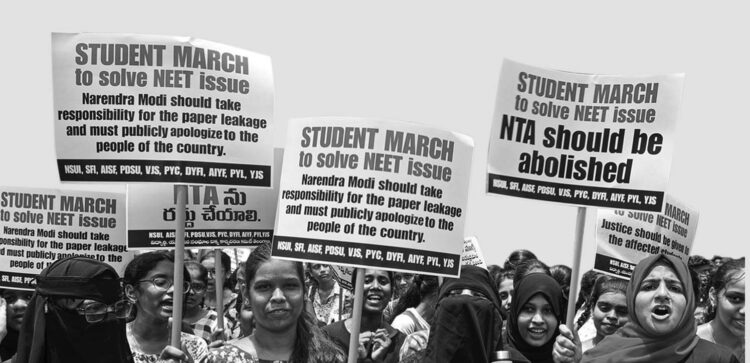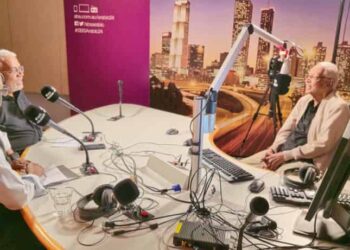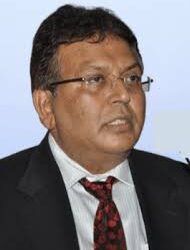The entrance test has been advocated for admission in both graduate and post-graduate medical and dental degree courses by the Medical Council of India (MCI) on all India basis. The test was elaborately named National Eligibility cum Entrance Test (NEET) by announcing that the prerequisite courses i.e. upto +2 level, is not the eligibility criterion. Without any due planning, and simply to satisfy the interest of coaching centres, the MCI finalised the Test in 2010. Subsequently the MCI Act was amended to suit the conduct of NEET.
The main State, perhaps the only State that opposed NEET has been Tamil Nadu from the beginning. Conceptually NEET is not compatible both in the contents and the way it was designed and conducted.
At first NEET pronounced is unconstitutional. Later, by hearing of the appeal Bench in the apex court, a favourable clearance was obtained to conduct NEET. However, Tamil Nadu did not come forward to implement NEET, seeking exemption on adhoc basis but later it had to follow accept NEET following the apex court order.
Tamil Nadu has been well advanced in Medical education since the 19th century. The products of medical institution have been contributing to the cause of medical health of not only Tamil Nadu and other States but also of the entire humanity globally. Comparatively, Tamil Nadu has got more number of government medical colleges, offering medical and dental degree courses, post graduate and much demanded super speciality courses. All these medical institutional infrastructures have been established mostly by the revenue collected in Tamil Nadu.
The major initiative is to be taken by the Union Government and other State governments to institute such educational infrastructure in their respective domain. Instead, under NEET it has been attempted to curb the opportunities available to poor as well as the deprived students from rural areas. The syllabus of NEET is more oriented towards Central Board of School Education (CBSE). It is against and entirely new to the majority of students who had studied under respective State Board syllabus.
Many high ranking students in +2 exam could not score the minimum marks in NEET. The very fundamental Principle of NEET is flawed. It is a blatant denial of equal opportunities to the candidates. Various agitations and demonstrations are being held in Tamil Nadu enmass beyond the political partys’ line to oppose NEET. Till now many students and members of students’ families died of suicide mostly due to the stress they suffered to appear for NEET, at the centres that warranted more than a day or two to travel by train from their native place.
Is NEET for the cause of students aspiring medical education or the aspirers have to meekly submit to the dictum of adamant authorities? All these factors are about the content and design of NEET that had swallowed many lives in many states.
Major Conceptual flaw:
The reason that was pointed out while introducing NEET is to standardise the medical education. Standardising medical education can be done by improving the syllabus and infrastructure for suitable learning environment. How can we expect standard from students at the time of admission? The only option is through the marks secured by them.
A simple comparison with +2 course marks and the marks in NEET will expose the glaring difference and discrimination.
In reckoning the +2 course marks it is essential for the candidate to secure significantly higher marks in the science subjects viz. Biology, Chemistry and Physics to attain the cut-off marks. It would be impossible for a candidate securing less marks comparatively in the subjects.
In respect of NEET, invariably the questions cover all the subjects as said earlier. There exists possibility to reach the cut off marks even if all the questions in a particular subject, say Biology, are unanswered, practically ‘0’ marks in biology. Because of answering all questions correctly in other subjects like Chemistry and Physics, the candidate could reach the cut-off point to get admission. By this there is possibility for a candidate who has not secured any mark in biology in NEET can get admission in medical college. Can we imagine such a candidate becoming a doctor to study the biology of human to diagnose the disease or ill health and provide treat prescribe medicine? Is it the standard, the authorities of NEET expect in medical and dental courses?
In the NEET 2024, many such irregularities erupted in various centres of northern states. In respect of conduct serious flaw was the question paper leak a few days prior to the NEET. The question papers are said to have been sold for huge sums of money. This question paper leak has occurred in the current year (2024) in states like Maharashtra, Bihar, Haryana, Jharkhand etc. The leakage is expected to lead to a big scam about NEET and the case is handed over to Central Bureau of Investigation (CBI). Many persons alleged to be involved have been investigated and upon evidence they have been arrested. An arrested person is alleged to have said that such question paper leakages have been a routine affair even earlier.
Besides, many candidates have chosen the exam centres which is in no way connected to them. In such centres, many candidates have scored higher marks in NEET. Thorough investigations have to be carried out. Besides, in NEET 2024, many candidates have secured full marks 720 in total compared to earlier tests. One peculiar observation is that candidates have secured the full marks of 720 from a particular centre in Rajasthan. Their register numbers were in continuous series. Will it be practically possible? What sort of standard the authorities have planned to bring in medical education.
One more issue that erupted in NEET 2024, was inclusion of questions out of syllabus for which a few candidates have applied for grace marks and they were awarded the same. Many candidates who did not apply for it have not been awarded grace marks. Inclusion of questions out of syllabus is common to all. Grace marks must be awarded to all candidates who had appeared for NEET. (Recently the Supreme Court has directed that the candidates awarded with grace marks may sit for new test. Accordingly National Testing Agency (NTA) has conducted the test for them alone.)
Again an impracticable thing has happened. The total marks is for 720 and the number of questions are 180, at the rate of 4 marks for the correct answer and negative mark of 1 for the wrong answer. The marks secured by the candidates have been announced as 717, 718 and like that. How could it be possible? Either the total marks secured must be 720, 716 or 715 (in case one question is answered wrongly). The securing of 717, 718 is entirely impossible. The way NEET is conducted has led to a lot of mess like this. What sort of standard can be expected of this NEET?
Knowing all these things, the student communities and various social organisations are protesting against NEET all over the country. One glaring but factual information is widely discussed in public domain is that the Constitution of National Testing Agency (NTA). NTA is not a part and parcel of government controlled machinery but an organisation, registered under the Societies Act. How the Union Government has callously assigned the task of conducting a National Test to a society is a puzzle.
Both conceptually and adopted procedure wise NEET has got many negative attributes. When the State government conducted eligibility test as +2 exam that will be sufficient for making admission to medical education. The entrance test is also extraneous that has produced sufficient causalities and hardship apart from many irregularities. The only solution lies in the abolition of NEET. The mode of admission must be decided by the respective State government. To proceed in this line, the foremost thing required is the Amendment of the Constitution to bring ‘Education’ from the Concurrent List to the State List. Nothing short of it shall save us from the menace called NEET, which is ironical to standardization of medical education.







